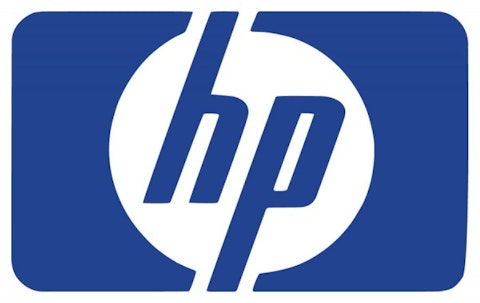
Source: Fool.com
Earlier this week, the committee that oversees the widely followed Dow Jones Industrial Average (INDEXDJX:.DJI) announced the biggest shake up to the Dow Jones Industrial Average (INDEXDJX:.DJI) since 2004. Hewlett-Packard Company (NYSE:HPQ) will lose its spot in the Dow after more than 15 years, as will Alcoa and Bank of America. The three will be replaced by Visa, Nike, and Goldman Sachs.

However, for long-term investors, “Dow status” is meaningless. Right now, Hewlett-Packard Company (NYSE:HPQ) seems incredibly cheap, considering its strong free cash flow performance. As a result, I would view any sustained sell-off as a buying opportunity.
Media sensationalism
The committee responsible for the upcoming changes to the Dow Jones Industrial Average (INDEXDJX:.DJI) made its rationale very clear. According to the press release, “The index changes were prompted by the low stock price of the three companies slated for removal and the Index Committee’s desire to diversify the sector and industry group representation of the Index.”
In other words, Hewlett-Packard Company (NYSE:HPQ) was removed from the index primarily because of its past stock performance, not on the basis of any judgment about its future prospects. Nevertheless, many media outlets wanted to make something more of the story.
For example, on Tuesday a Bloomberg reporter wrote, “The exit [from the Dow] … delivers another blow to Chief Executive Officer Meg Whitman’s quest to revive growth at the storied PC maker.” However, it seems highly unlikely that many customers are choosing whether to use HP or a competing vendor on the basis of Dow Jones Industrial Average (INDEXDJX:.DJI) membership. Losing its spot in the Dow may symbolize HP’s fall over the past few years, but it has no impact on the company’s prospects.
It’s all about the fundamentals
As I pointed out last month, Hewlett-Packard Company (NYSE:HPQ) seems extremely cheap today from a free-cash-flow perspective. The company has a market cap of $43 billion, but is expected to produce free cash flow of nearly $8 billion for FY13. That implies a free-cash-flow yield of more than 18%.
Hewlett-Packard Company (NYSE:HPQ)’s management team has done an admirable job of improving cash flow despite the company’s other problems. If HP hits its $8 billion target this year, that will represent modest growth over last year’s free cash flow of $7.5 billion.
For a value stock like HP, free cash flow is one of the most important metrics for investors to follow. It highlights the amount of cash that the business is generating, which is also the amount that shareholders could potentially receive in the form of dividends or share repurchases. Moreover, Hewlett-Packard Company (NYSE:HPQ) is on the verge of hitting its zero net-debt target, at which point it will be able to deploy more of its cash flow for such shareholder-friendly actions.
Foolish bottom line
It’s easy to get caught up in the day-to-day hype of Wall Street’s talking heads. HP’s exit from the Dow Jones Industrial Average (INDEXDJX:.DJI) may seem like an important event, but for long-term (or even medium-term) investors, it’s not. “Dow membership” does not show up anywhere in HP’s cash flow statement. As long as HP continues to crank out cash at an $7.5-$8 billion/year rate, and returns that cash to shareholders, HP investors will be very happy in the end.
The article Who Cares That HP Was Booted From the Dow? originally appeared on Fool.com and is written by Adam Levine-Weinberg.
Fool contributor Adam Levine-Weinberg owns shares of Hewlett-Packard Company. The Motley Fool recommends Bank of America, Goldman Sachs, Nike, and Visa. The Motley Fool owns shares of Bank of America, Nike, and Visa.
Copyright © 1995 – 2013 The Motley Fool, LLC. All rights reserved. The Motley Fool has a disclosure policy.



